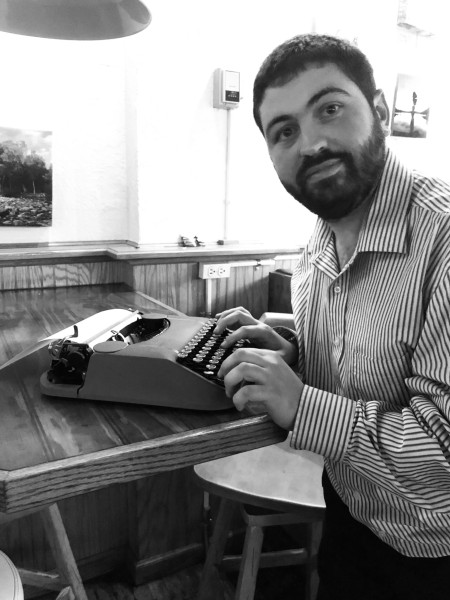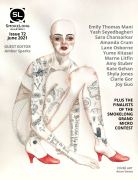Your story features a unique and compelling narrative style, combining a first-person collective point of view, a fairly wide psychic distance, and an abundance of pop-culture references. All of this has the effect of moving the focus away from these specific characters, making little effort to individualize them, to pit them against each other. Instead, they all band together in a struggle against larger circumstances. In your opinion, what are the advantages of approaching the narrative from this angle?
I think this angle allows the community itself to take on more of an identity and allows setting to come into play. It allows me more fluidity on the page. And, as you mention, the collective point of view allows them to grapple with those larger circumstances. To focus on only person would cut down on the sweeping view of this community.
At the same time, you illustrate this struggle—while also creating potential divisions among the characters—through your stratification of the pop culture references, differentiating between the refined work of Glenn Miller and Tchaikovsky and the pop country of Patsy Cline, between cheap beers like “Bud and Miller” and the higher-aiming Fat Tire, etc. This is echoed in the later disappointment experienced at the grocery store, when the characters settle for “Michelina’s TV dinners, Lays potato chips,” etc., instead of the preferred “tilapia, coconut shrimp, even lobster.” Do you see this tiered system as one of the causes of the characters’ frustrations or merely a symptom of their battered lives?
The music itself represents lost talent among community members. Musical ambitions stifled. And the beers and foods in questions certainly do symbolize their frustrations. They just want the opportunity to savor something a little better, to break beyond their usual shibboleths. They want a taste of the good life, their own American dream, and life hasn’t accorded it to them. So, you could certainly say that the music along with the food and beer in question are both a symptom of and a broader cause of frustration.
The story’s rural setting is also treated as a source of conflict in the character’s lives, as they find themselves living for “that one night [they’re] released from homes down country roads that curve and end, that the forest eats up.” Options are limited (e.g., they shop at the “local market” in part to “listen to the oldies rising from hidden PA speakers”), and desperation lurks around every corner (e.g., “by Sunday, half the food’s gone, more papers are filled up with arresting minus signs and amounts and things we’ve forgotten and broken”). Did you write this story with a specific type of place in mind? What do you find compelling about such a setting?
I live in Garden Valley, Idaho, and while this community is fictitious, Garden Valley certainly served as a muse. To be honest, the trigger for this story was taking some trash to the dumpster and being overwhelmed by the litany of items within it. They’ve been a source of fascination for me, something that lets me make inferences about the community, to think about the lives many of my fellow community members lead. It’s just fascinating to think about the notions of limitation and isolation in a small enclave like this, the signs of malaise among the beauty of the Ponderosas, the things that hamper good people.
One of the most interesting lines comes late in the story, when things are falling apart for these characters: “The dumpster is piled high, a sociologist’s dream.” This seems to indicate a voyeuristic quality to the act of observing, as an outsider, people living this sort of life. How do you relate this line to the role of the reader?
Well, as I mentioned, the story was inspired by taking trash to a dumpster and assessing the contents other residents had disposed of. So, I’d say it’s an opportunity for the reader to also dig into that Dumpster and try to think about the shape and scope of their lives and to hopefully come to a point of real empathy. To attain a personal communion with these people on the page and in the very real communities beyond it.
Finally, the end of the story seems to indicate the depicted events are a common part of the characters’ lives (e.g., “just another load tossed, another item released, another vehicle sputtering away”), while the fact the story is built upon a full week, Monday through Sunday, suggests this is even routine. Why did you want to focus on these circumstances at a point where everything is firmly set in motion rather than on the developments that preceded them?
I think sometimes going big in scope can mean going small! One week was meant to highlight the “normal,” something that’s been routine for some time in this community. And I felt like it would have great emotional impact to show that this is life in this community. These are the everyday routines, the lives the collective we lead. Plus, I think one can make inferences from the images of community malaise and come to conclusions about what might have happened in the months and years before the story takes place.



 The core workshop of SmokeLong Fitness is all in writing, so you can take part from anywhere at anytime. We are excited about creating a supportive, consistent and structured environment for flash writers to work on their craft in a community. We are thrilled and proud to say that our workshop participants have won, placed, or been listed in every major flash competition. Community works.
The core workshop of SmokeLong Fitness is all in writing, so you can take part from anywhere at anytime. We are excited about creating a supportive, consistent and structured environment for flash writers to work on their craft in a community. We are thrilled and proud to say that our workshop participants have won, placed, or been listed in every major flash competition. Community works.